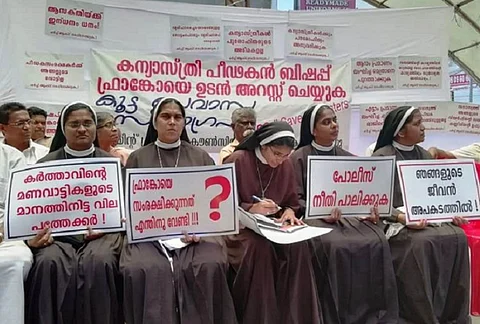

In June 2017, a nun from the Missionaries of Jesus Congregation approached several church authorities seeking justice. Beginning with her parish priest, she complained of being repeatedly raped by Bishop Franco Mulakkal, of the Jalandhar diocese. But church authorities failed to acknowledge or address her complaint. Local bishops washed their hands of the issue and blamed a lack of jurisdiction over the Bishop Franco as the reason behind their inability to intervene.
A year later, in June 2018, the nun filed an FIR. While she found some support, large and vocal sections of Indian Christians – clergy and laity – saw the complaint as a malicious attempt to sully the church and the powerful man it sought to protect.
The complaint against Bishop Mulakkal has brought to light several procedural flaws in the mechanisms of the church. There is a complete lack of clarity on the procedures and policies that exist within the church around complaints of sexual harassment and assault. That includes to whom they should be addressed, how they’re handled and what resources are available to the survivors. Despite the passage of the ‘CBCI Guidelines to Deal with Sexual Harassment at Work Place’ by the Catholic Bishop’s Conference of India’s standing committee in September 2016, these guidelines provided no support to the survivor nun.
In the modern-day church, patriarchy has been internalised as part of ‘Christian culture.’ Power is legitimised, so anyone in a position of authority appears to be above criticism. Commenting on the public protest for the arrest of the accused, PC George, a Catholic and a member of the state legislative assembly, accused the nun of being a prostitute, and said, “the victim nun is not eligible to be nun, she has ceased to be a virgin the day she was abused the first time.” At the same time, Mulakkal’s vows of celibacy were never questioned. These voices reflect a deep-rooted patriarchal bias which is neither based on the Christian doctrine nor the law of the land.
Though church authorities claim neutrality, Bishop Franco was visited by several church leaders while in jail and was given a hero’s welcome on his release on bail. The nun, however, was visited by none of them and has received no such support. This open display support by church authorities delegitimises the complainant and her ability to fight her case.
In responding to sexual abuse within the church, Pope Francis has said “no effort must be spared to create a culture able to prevent such situations, but also to prevent the possibility of their being covered up and perpetuated.” This proclamation by the head of the church must be translated into reality.
First and foremost, church authorities must formally acknowledge the complaint made by the survivor sister. An inquiry committee must be instituted to look into the complaint, and evaluate the action taken till date. Bishop Mulakkal should be relieved of his title, along with its privileges and authority, until this case is closed. This would demonstrate the church’s commitment to justice and a fair trial.
In the wake of these allegations, church authorities should be working alongside survivors, women’s rights groups and legal advisors to develop and implement a robust policy within a fixed timeline. A monitoring system should be formed to cover all institutions linked to the church. The policy should create a more expansive definition of the workplace (or any other term to indicate where and to whom this policy would be applicable) to include churches, residences of clergy, seminaries, convents as the workplace of the religious, whether they are permanently stationed there, temporarily visiting or the staff employed in that particular institution.
The need for remedial action is urgent. The Catholic Church has a chance to show its commitment to go beyond mere words — that it will spare no effort in creating and enforcing a culture to prevent assault and harassment against women, and further prevent the possibility of their being perpetuated and covered up.
The views reflected in the story are the author’s own.
Anita Cheria is the Director of OpenSpace. She is a social analyst and activist, who works with and writes on people and institutions that advocate for good governance and inclusion. Website: openspace.org.in